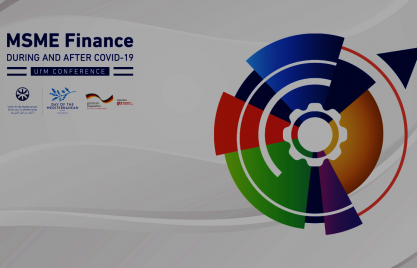Yalla Fintech 2020 is the Arab world’s first digital hackathon to boost collaboration and novel solutions in Fintech that make a difference for Financial Inclusion. Dialogue with industry experts makes a strong case for the powerful innovative potential in the region for development objectives.
The new era of tech in finance (Fintech) is affecting societies and economies worldwide. The 2020 pandemic accelerated the uptake of digital finance and digital financial services (DFS) can help communities and businesses during the response to and economic recovery from the pandemic.
Countries that had already invested, for example, in the digital financial infrastructure were better able to disburse government aid payments more efficiently and quickly (The Economist 2020). In Jordan, mobile payment usage increased as a result of aid distribution via mobile wallets, with both the number and value of transactions increasing significantly (JOPACC 2020).
Across the Arab region, however, access to financial services still means a potential market of around 300 million adults, next to a combined funding gap by businesses of around USD 186 billion (World Bank Findex 2017; SME Finance Forum 2020).
Additional financial inclusion in Arab countries, reaching half the untapped market for individuals and businesses by 2024, is estimated to bring about an additional revenue potential of USD 7 billion for financial services providers, notwithstanding spill-over effects into labour markets (CGAP 2019).
A digital dialogue session with experts revealed what it would take for Fintech to help realize the inclusive growth potential in the region:
Enabling regulatory framework: the legal framework not only defines the scope of possible fintech activity and ideally proportionate, risk-based safeguards. It also opens new pathways for innovators into the market. Enabling regulation is key for safe fintech innovation. Establishing dialogue with the sector is a good starting point to learn about the regulatory obstacles that innovators face.
Open payment infrastructure: fintech entrepreneurs can build applications on top of the existing payment railways. A range of use cases also encourages e-money recipients to stick within the digital finance ecosystem and not immediately cash out. If people and businesses are to make increased use of modern financial services, the payment system must be inclusive for new providers and applications.
Affordable services: inclusive fintechs must provide cost efficient and client-oriented services. This includes the ability to manage low value-high volume transactions and balances at scale.
Appropriate services: in Arab countries, around 23 million people are part of rotating savings and credit associations. Convenience and trust play a role. With money management use cases superior to cash, digital financial services can be more appealing to the informal majority that is not leaning towards traditional bank services. And these need to meet privacy and security expectations to build trust. Local fintechs with the local expertise have an advantage.
Competitive advantage: the task at hand is to create applications that are better from a user perspective than those from incumbents or other innovators. It is the product features at this level where fintech entrepreneurs focus their competitive advantage and they need it be attractive to investors as well. Scaling fast, even across borders at the right time, be successful.
Guaranteed access: for the target groups of financial inclusion, the conditions for access to financial services must also be guaranteed. On the one hand, this implies that they must have unrestricted access to the necessary devices, internet access and reliable power supply. On the other hand, the digital applications must be designed to be intuitive and simple.
Lastly, given the scale economics in tech, regionally harmonized framework conditions for fintech can facilitate the expansion of local innovative business models and the uptake of digital finance solutions.
Access the full digital dialogue highlights here.
It is obvious that there are manifold and multi-layered challenges to overcome in order to achieve the goal of inclusive financial systems. And the more ambitious and significant the goals of social change are, the more important it is to work cooperatively on them with foresight and vigour. Promoting financial inclusion through financial technology solutions is precisely such a socially significant goal.
By Sebastian Kausemann and Atilla Yücel



